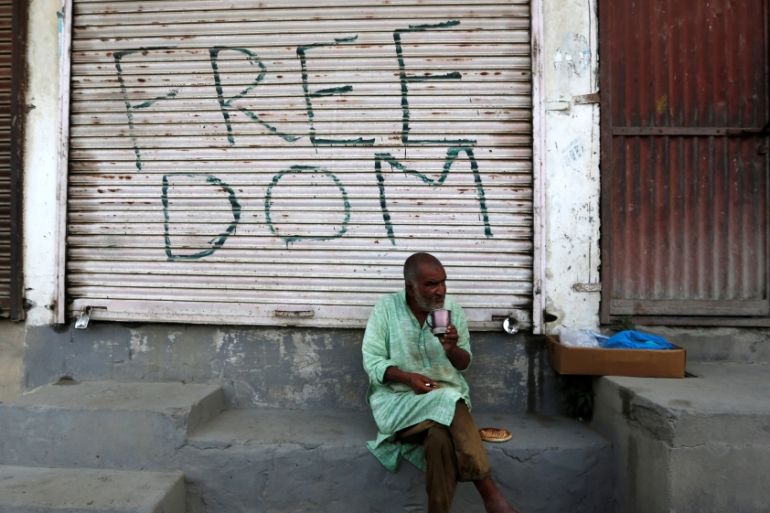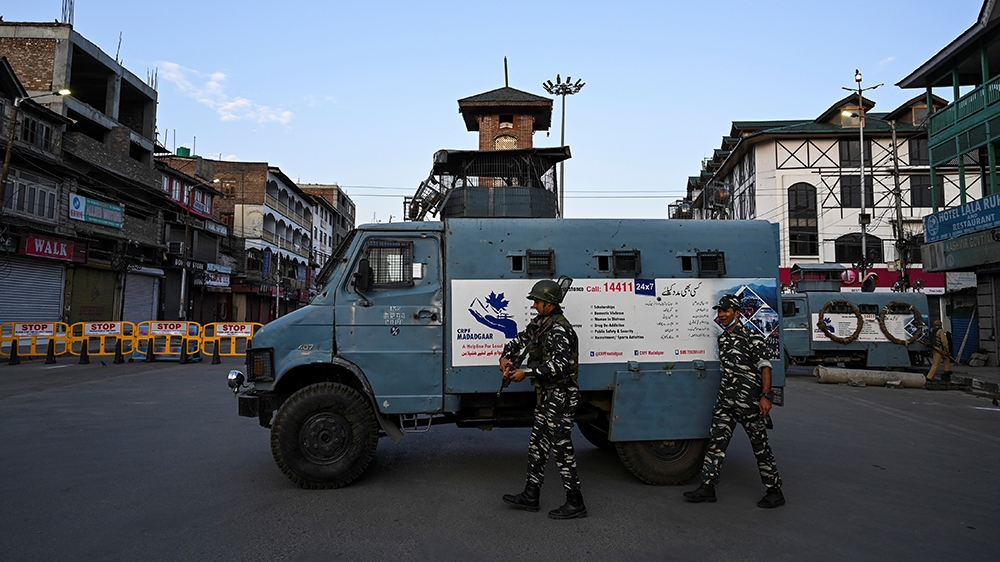Activists call for ‘global spotlight’ on plight of Kashmiris
Black Lives Matter, Palestinian and other activists express solidarity with Kashmiris ahead of revocation anniversary.

Black Lives Matter, Palestinian, Uighur, Indigenous and Rohingya activists have come out in support of the people of Indian-administered Kashmir, calling for a “global spotlight on the suffering and their resistance”, ahead of the one-year anniversary of the revocation of the region’s autonomy by India’s Hindu nationalist government.
On August 5, 2019, Indian Prime Minister Narendra Modi’s government abrogated Article 370 of India’s constitution that granted the Muslim-majority region a special status, with powers to make its own laws in all matters except finance, defence, foreign affairs and communications.
Keep reading
list of 4 itemsHow US police are co-opting a law meant to protect victims of crime
Former US police officer sentenced in killing of Black man Elijah McClain
US paramedics found guilty in 2019 death of Black man Elijah McClain
The region was placed under an unprecedented security lockdown and internet shutdown for months following the decision, drawing condemnation from rights organisations and the United Nations.
“I am sending this strong word of deep solidarity with my precious brothers and sisters in Kashmir facing a vicious Indian occupation generating levels of dominations, social misery and suffering,” said Harvard University Professor Cornel West in a video message released on Tuesday by the Stand with Kashmir group.
“Let’s cast a national global spotlight on both the suffering and the resistance.”
Days before the anniversary, thousands of Indian troops were ordered to impose a two-day curfew in Kashmir, blocking main roads with razor wire and steel barricades, citing intelligence reports of looming protests.
Kashmiris have called for the anniversary to be marked as a “black day”.
‘A brutal occupation’
About 7,000 people were taken into custody whereas hundreds remained under house arrest or behind bars without charge.
“This is a message to my Kashmiri brothers and sisters who are enduring a brutal occupation and being repressed by the most violent means,” Mariam Barghouti, a Palestinian activist and writer, said in the video message for the US-based Kashmiri diaspora group.

“I know that the plight for self-determination is difficult and oppressors rely on making their violence invisible and that they rely on making us invisible but your voices are heard and your shouts and screams as difficult as they are to utter are heard.”
A year on, life remains hard in Kashmir with several checkpoints still in place and half a million jobs lost in the region by the end of 2019, according to the Kashmir chamber of commerce.
Kashmiris fear New Delhi’s decision to allow Indians from other states to buy land and compete for local jobs are aimed at demographic change in the region of nearly eight million people.
Beyond sharp words from Malaysia, Turkey and UN human rights chief Michelle Bachelet, international reaction over the August 5 decision, has been largely muted.
“As a Rohingya, going through a process of what is called a genocide and living in fear of not being able to protect loved ones, I would never understand why the international community takes so long to respond,” Yasmin Ullah, a Rohingya activist, said.
Kashmir has been split since 1947 between India and Pakistan, both of which claim it in full. India accuses Pakistan of sending fighters over their de facto Kashmir border to conduct attacks and also of supporting rebels on the ground, charges that Islamabad denies.
In Pakistan, anti-India protests are planned throughout the country while all major cities in Pakistan will hold solidarity marches, along with a one-minute silence.

Activists from around the world have expressed solidarity with Kashmiris, with Pakistan Prime Minister Imran Khan accusing India of turning the Muslim-majority region into an “open-air prison”.
“Right now Kashmir is the largest militarised region in the world and right now Kashmiris are stripped of a very basic human rights and forms of self dignity,” Aydin Anwar, an Uighur activist, said.
“For the Kashmiri cause, I urge you all to continue to remain strong and courages to find against the appaling occupation.”
‘False claims’
Ashok Koul, the general secretary of the governing Bharatiya Janata Party (BJP), defended last year’s government move.
“The last one year has been very good for Jammu and Kashmir. Militancy has reduced and the number of locals joining militancy has also come down,” Koul told Al Jazeera.
But official data show a growing number of Kashmiri youth joining rebel ranks.
Koul dubbed allegations of human rights violations in Kashmir as “false claims”. “Since 1947 this has been the business for diaspora groups and the activists to run these false campaigns. They have been doing it and these campaigns are their bread and butter.”